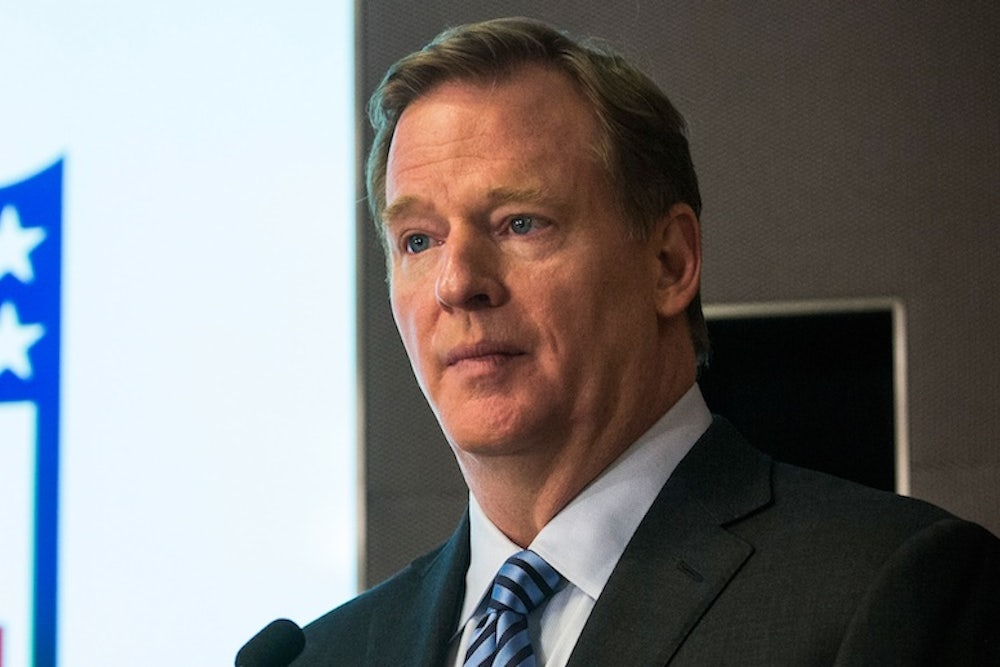NFL Commissioner Roger Goodell has gotten a lot of grief over the last few days. Here’s hoping he gets a lot more.
Goodell is in trouble because of his weak reaction in the case of Ray Rice, the Baltimore Ravens running back accused of hitting his fiancee back in February. You may have heard about the incident. If not, you may have seen the now-infamous video of Rice dragging the woman, to whom he is now married, out of an elevator at an Atlantic City casino. Rice, who pled not guilty to assault, avoided a trial by agreeing to enter counseling. Late last month, Goodell handed down the league's punishment—which turned out to be a fine of just $500,000 and a suspension that will last just two games. Players typically sit out longer if they're caught using drugs, including marijuana. That is one reason that Goodell's decision provoked an outcry.
On Friday, the commissioner defended himself by pointing to a series of what he said were mitigating factors. Rice had no previous history of off-the-field problems, Goodell said, and the punishment was consistent with NFL precedent. "I was also very impressed with Ray in the sense that Ray is not only accepting the issue and saying I was wrong, but he is saying I want to make a powerful difference in this area," Goodell said. "I think you heard from him yesterday—he's a young man who really understands the mistake he made, and he's bound and determined to make a difference."
Maybe Rice is truly contrite and committed to making amends. Great. How much should that affect the league's reaction? Although domestic violence has actually been on the decline for the last two decades, it’s still far too prevalent. (If you don’t believe me, visit a shelter for battered women sometime.) Government can help, as it did when it passed the Violence Against Women Act in 1994, making available huge new resources for helping victims and prosecuting their abusers. But there are some things that government can’t do, at least on its own, and one of those things is changing attitudes. That requires a strong, unambiguous message that domestic abuse has no place in civilized society—ideally, coming from the people and institutions that would-be abusers trust or see as role models.
The NFL would seem to have a special responsibility to act. According to a recent analysis by Benjamin Morris of fivethirtyeight.com, pro football players are "particluarly prone to domestic violence arrests." But Goodell and the NFL apparently didn't want to send too strong a message, either to its players or the rest of the world.
Surprising? I guess not. Depressing? You bet.
—Jonathan Cohn
Things to know:
IMMIGRATION: Forget the influx of kids from Central America. The conversation is focusing on President Obama's vow to take executive action on immigration policy—and what that would mean. Ross Douthat seems almost certain certain that Obama is about to take “lawless, reckless” action. (New York Times) Brian Beutler doesn’t agree and neither does Eric Posner. (New Republic)
ECONOMY: Did you hear that Argentina defaulted? Matt O'Brien explains everything you need to know about it. (Washington Post)
OBAMACARE: Obamacare may be reducing the number of insured, but in the latest Kaiser Tracking Poll its negative ratings actually increased. Paul Waldman says the numbers suggest that the law will remain unpopular for a while, no matter how it performs. (Kaiser Family Foundation, Washington Post)
DEATH PENALTY: Maurice Possley, from the Marshall Project, has uncovered new evidence that Texas wrongly executed a man ten years ago. The evidence consists of audio recordings, in which a witness explains exactly how and why he lied on the stand. (Washington Post)
CLIMATE CHANGE: More lawsuits against the executive branch! This time it's a dozen states challenging the EPA's carbon rules on power plants. (New York Times)
Things to read:
Not a drop to drink: In case you hadn’t heard, half a million residents in Toledo, Ohio haven't been able to drink their tap water ever since Saturday. Officials found a dangerous toxin, microcycstin, caused by the algae bloom in Lake Eerie. (Toledo Blade) Climate change and farming practices are at the root of the water pollution problem. (Suzanne Goldenberg, Guardian)
Why the kids keep coming: Randal C. Archibold describes a Honduran town overrun by gang violence: "The police remain so unable to take on the gangs and cartels that sometimes they do not even have gas in their aging vehicles to go on patrol." (New York Times)
Some lessons in law: Adrianna McIntyre reviews five common mistakes that reporters make when covering the new lawsuits against Obamacare. (Vox)
Things to watch:
Members of Congress are back home, in their states and districts. Will they hear it from constituents angry about the inaction on immigration—or any other issues?
Things at QED:
Rebecca Leber writes about black lung disease—and the coal industry’s effort to undermine new safety regulations designed to protect workers from it. And speaking of the NFL, Bryce Covert thinks pro football’s cheerleaders should be the heroes in the campaign for fair pay.
